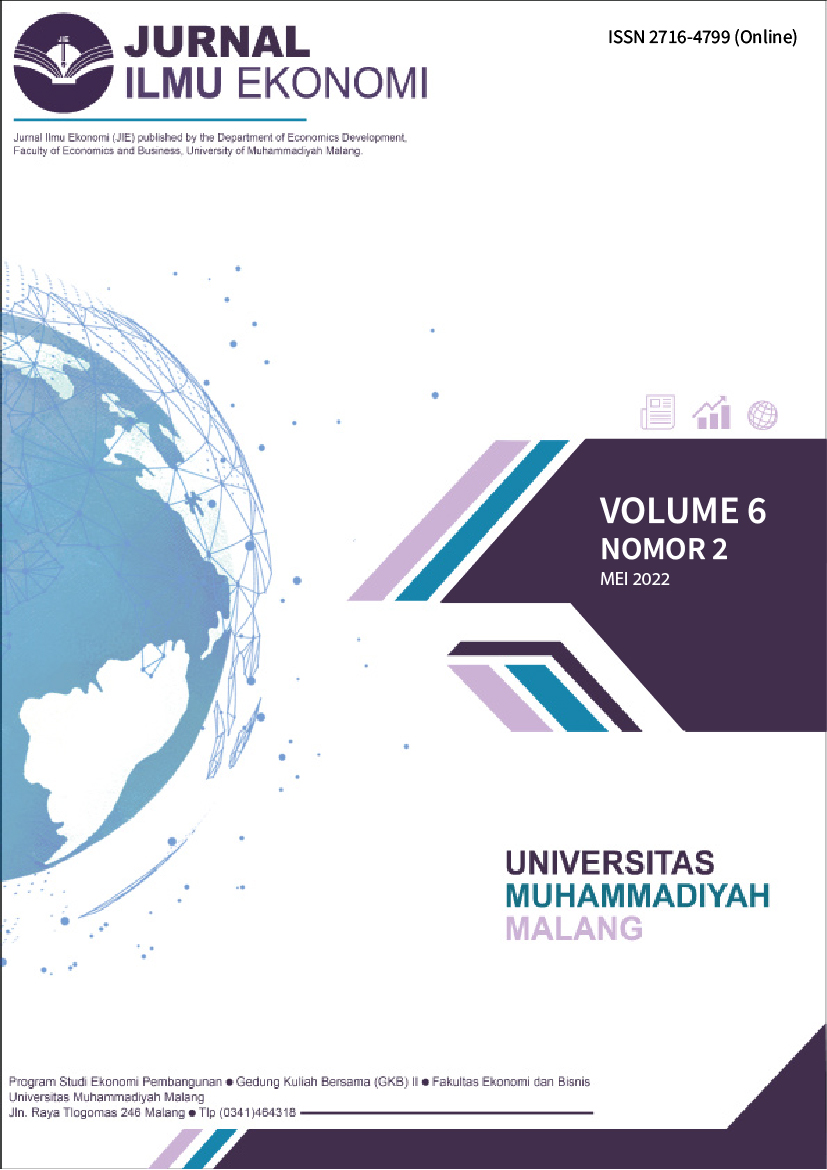Analisis Keterkaitan Sektor Industri Pengolahan Terhadap Perekonomian di Provinsi Jawa Timur (Pendekatan Input Output)
DOI:
https://doi.org/10.22219/jie.v6i2.20459Keywords:
Backward linkages, Forward linkages, Input output, Multiplier effectAbstract
Against the Economy in East Java (Input Output Approach). Along with the rapid development of industrialization, the manufacturing sector has increased and shifted the agricultural sector. This article aims to examine the relationship between the manufacturing sector and other sectors in East Java Province and examine the impact of the manufacturing sector multiplier. Analysis of input output with secondary data Input Output. The results show that the manufacturing sector; service sector; agriculture, forestry and fisheries have forward linkages to the manufacturing sector. Furthermore, the information and communication sector; the accommodation and food and drink provision sector has backward linkages to the manufacturing sector. The output and labor multiplier is quite large compared to other sectors, while the income multiplier is larger than other sectors.
Downloads
References
Arsyad. (2010). Ekonomi Pembangunan. UPP STIM YKPN Yogyakarta.
Azwar, M. (2017). Peranan Sektor Ndustri Pengolahan Dalam Perekonomian Provinsi Jawa Tengah. Economics Development Analysis Journal, 4(3), 282–291. https://doi.org/10.15294/edaj.v4i3.14835
BPS, P. J. T. (2021). No Title. BPS, Provinsi Jawa Timur.
Desiyanti L, N. P. A. (2020). Analisis Keterkaitan Sektor Pertanian Dan Pengaruhnya Terhadap Perekonomian Indonesia (Analisis Input Ouput). Jurnal Ilmiah Satyagraha, 3(2), 140–157. https://doi.org/10.47532/jis.v3i2.178
Firmansyah. (2006). Operasi Matrix Dan Analisis Input Output (I-O) Untuk Ekonomi. Universitas Diponegoro.
Firmansyah, M., Haryadi, H., & Umiyati, E. (2015). Analisis Keterkaitan Industri Pengolahan Dalam Perekonomian Provinsi Jambi (Pendekatan Input Output). Jurnal Perspektif Pembiayaan Dan Pembangunan Daerah, 3(2), 101–114. https://doi.org/10.22437/ppd.v3i2.3503
Hirschman. (n.d.). The Strategy of Economic Development. Yale University Press.
Kemenprin.go.id. (2020). Kontribusi Industri Pengolahan Terhadap PDRB Nasional.
Kominfo.jatimprov.go.id. (n.d.). PDRB ADHK.
Perwitasari, H., & Sari, N. . (2013). Analisis Input-Output Komoditas Kelapa Sawit di Indonesia. Jurnal Lmu-IImu Pertanian, 9(1), 11–21.
Rahmah, A. N., & Widodo, S. (2019). Peranan Sektor Industri Pengolahan dalam Perekonomian di Indonesia dengan Pendekatan Input – Output Tahun 2010 – 2016. Jurnal Ilmu Peternakan, 1(1), 2–34.
Suahasil, N. (1997). Analisis Input Output. Lembaga Penerbitan FE UI.
Subandi. (2012). Ekonomi Pembangunan. Unit Penerbit Alfabeta.
Sukirno. (2008). Makro Ekonomi Teori Pengantar. Rajagrafindo Persada.
Sukirno. (2016). Mikro Ekonomi Teori Pengantar. Rajagrafindo Persada.
Downloads
Published
How to Cite
Issue
Section
License
Copyright (c) 2022 Agustin Fathimatuz Zahroo

This work is licensed under a Creative Commons Attribution-ShareAlike 4.0 International License.
Authors who publish with this journal agree to the following terms:
- For all articles published in the JIE (Jurnal Ilmu Ekonomi), copyright is retained by the authors. Authors give permission to the publisher to announce the work with conditions. When the manuscript is accepted for publication, the authors agree to the automatic transfer of non-exclusive publishing rights to the publisher.
- Authors retain copyright and grant the journal right of first publication with the work simultaneously licensed under a Creative Commons Attribution-NonCommercial-ShareAlike 4.0 International License that allows others to share the work with an acknowledgement of the work's authorship and initial publication in this journal.
- Authors are able to enter into separate, additional contractual arrangements for the non-exclusive distribution of the journal's published version of the work (e.g., post it to an institutional repository or publish it in a book), with an acknowledgement of its initial publication in this journal.
- Authors are permitted and encouraged to post their work online (e.g., in institutional repositories or on their website) prior to and during the submission process, as it can lead to productive exchanges, as well as earlier and greater citation of published work (See The Effect of Open Access).
This is an open access article and licensed under a Creative Commons Attribution-NonCommercial-ShareAlike 4.0 International License








